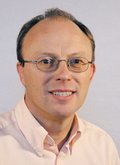Page path:
- Press Office
- Press releases 2007
- New Director
New Director
New Head of the Max Planck Institute for Marine Microbiology in Bremen
On 1 July 2007 the new managing director Prof. Dr. Rudolf Amann will assume office and take over the administration of the Max Planck Institute for Marine Microbiology (MPI). Rudolf Amann started as Head of the Department of Molecular Ecology in 2001 and is a full professor at the University of Bremen in the Department of Biology. Natural occuring microorganisms are the main topics of the whole institute: These organisms convert many chemical substances and keep the planet Earth in a habitable state for mankind.Professor Amann’s research at the MPI links the other two main research departments, the Departments of Microbiology and Biogeochemistry.
Before moving to Bremen in 1997, Professor Amann was employed as a senior scientist (Hochschulassistent) at the Technical University Munich. There he developed a novel technique for detecting and analysing bacteria in samples from the environment. The Fluorescence in situ hybridisation (FISH) approach was a breakthrough in environmental studies, as it became possible to discriminate the bacteria by using specific probe molecules binding only to their target organisms. As these probe molecules carry a dye which highlight the specific cells, studying bacteria and their communities directly under the microscope has drastically improved. Rudolf Amann´s succesful research has been honored with several prizes, such as the Bergey´s Award and the Körberpreis.
Teaching is also very important for Rudolf Amann. In 2002 he founded the Max Planck Research School for Marine Microbiology MarMic for young gifted students from all over the world. In cooperation with the University of Bremen, the Jacobs University Bremen and the Alfred Wegener Institute for Polar and Marine Research the Max Planck Institute offers a Ph.D program for 60 young marine researchers from 30 different countries.
The Max Planck Institute for Marine Microbiology was founded in 1992 and has intensified its relationship with many international partners since then. Over the next three years, the new director plans major efforts in the coastal marine research and will intensify the northwest German research cooperations. Several years of successful cooperation in Wadden Sea research with the nearby University of Oldenburg may serve as a role model for future activities.
The cycling of the elements in the System Earth is the major aspect of Professor Amann’s research. He places great importance on the inter-disciplinary integration of basic research. In his own words: „Modern marine research needs both genome data and satellite data. It covers many orders of magnitude – we are dealing with objects the size of an ocean down to the microscopic genes. Based on deep scientific knowledge we want to understand the effects of global change on the seas and the whole System Earth“.
Manfred Schloesser
On 1 July 2007 the new managing director Prof. Dr. Rudolf Amann will assume office and take over the administration of the Max Planck Institute for Marine Microbiology (MPI). Rudolf Amann started as Head of the Department of Molecular Ecology in 2001 and is a full professor at the University of Bremen in the Department of Biology. Natural occuring microorganisms are the main topics of the whole institute: These organisms convert many chemical substances and keep the planet Earth in a habitable state for mankind.Professor Amann’s research at the MPI links the other two main research departments, the Departments of Microbiology and Biogeochemistry.
Before moving to Bremen in 1997, Professor Amann was employed as a senior scientist (Hochschulassistent) at the Technical University Munich. There he developed a novel technique for detecting and analysing bacteria in samples from the environment. The Fluorescence in situ hybridisation (FISH) approach was a breakthrough in environmental studies, as it became possible to discriminate the bacteria by using specific probe molecules binding only to their target organisms. As these probe molecules carry a dye which highlight the specific cells, studying bacteria and their communities directly under the microscope has drastically improved. Rudolf Amann´s succesful research has been honored with several prizes, such as the Bergey´s Award and the Körberpreis.
Teaching is also very important for Rudolf Amann. In 2002 he founded the Max Planck Research School for Marine Microbiology MarMic for young gifted students from all over the world. In cooperation with the University of Bremen, the Jacobs University Bremen and the Alfred Wegener Institute for Polar and Marine Research the Max Planck Institute offers a Ph.D program for 60 young marine researchers from 30 different countries.
The Max Planck Institute for Marine Microbiology was founded in 1992 and has intensified its relationship with many international partners since then. Over the next three years, the new director plans major efforts in the coastal marine research and will intensify the northwest German research cooperations. Several years of successful cooperation in Wadden Sea research with the nearby University of Oldenburg may serve as a role model for future activities.
The cycling of the elements in the System Earth is the major aspect of Professor Amann’s research. He places great importance on the inter-disciplinary integration of basic research. In his own words: „Modern marine research needs both genome data and satellite data. It covers many orders of magnitude – we are dealing with objects the size of an ocean down to the microscopic genes. Based on deep scientific knowledge we want to understand the effects of global change on the seas and the whole System Earth“.
Manfred Schloesser
